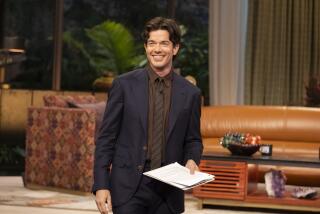Dick Whittington’s Back, With a Somewhat Different Shtick
- Share via
He once dropped a giant Alka-Seltzer in the Atlantic Ocean to protest government disposal of noxious gas. He’s declared war on Catalina Island, staged a wedding between the Queen Mary and the harbor cruise boat Prince of Long Beach, and air-dropped human hair (sent in by listeners) onto Mt. Baldy.
Now, (Sweet) Dick Whittington, the Southern California radio personality whose antics have endeared him to some listeners--and enraged others--is back on the air after a 15-month absence.
“Sweet Dick and his All-Night Shtick” airs on the graveyard shift, midnight to 6 a.m., Monday through Friday on Glendale’s small-scale KIEV-AM (87.0). Some observers, such as KGIL programming director Mike Lundy, suggest that Whittington has become more “serious” or “sophisticated.”
The 54-year-old Whittington acknowledges that he may have mellowed since his more notorious radio days, but he swears he’ll never be a wimp.
“I’ve been accused of mellowing out,” he says. “I have six hours. I’m sleepy. Most people probably didn’t know that there are many facets of me. If I’m serious, it’s because I’m dealing with people who are serious. I can be funny if the situation calls for it. Most of us metamorphose.
“I’ve matured,” he continues, fidgeting slightly in his chair. “I’m, hopefully, a better person. I haven’t mellowed, though. There’s still the anger. I still get upset at things I think are wrong, but I probably don’t show it as much. I’m more accepting.
“But that’s not to say I’ve become a wimp. They’ll never wimpify me.”
One recent morning, a man who identified himself as Alan called to say he’d been a fan for more than 20 years: “The other night was phenomenal radio because today’s radio--I’m tired, fed up, disgusted. This is refreshing; this is different and fun.”
Whittington’s penchant for the bizarre, however, established his reputation in the first place--and kept him on the move. He’s been on nearly every major AM station in the Southland during the last three decades--including being hired and fired four times at KGIL.
“He has a surrealistic sense of humor,” says KFI’s Gary Owens. “He’s a very intelligent man who can go in any direction.”
“He’s a cyclone of energy in the broadcasting business,” says Roger Barkley, who hired Whittington at KLAC in 1961.
“It’s unfair the way he’s been treated,” says Dave Hull, a fellow KFI a radio host in the ‘70s. “His mind is on a sphere that’s well above the rest of us and that frightens people in management. They think, ‘What is he going to do today?’ ”
Whittington admits that he’s had his share of professional disputes, but at KIEV--where he did a brief stint once before--it was made clear from the start that he would have a free rein over his material.
So far, his show’s been warmly received, says KIEV owner Fred Beaton. Although ratings were unavailable, he says, the station has had a lot of positive feedback from listeners via phone and mail.
“I’m not too proud to say that I’m doing this job because I need the money,” Whittington says. “I am the way I am.”
Immediately before coming to KIEV, Whittington was working on a series of “entertainment sports specials,” which the writers strike brought to a standstill.
“I had an offer in New York. What they were looking for was a ‘liberal Morton Downey Jr.’ . . . So I thought, why should I go to New York to do something I don’t even enjoy? I don’t want to shout at people.”
Instead, Whittington plays good-natured host to a hodgepodge of somewhat marginal types. His guest roster for the first week included a mysterious psychologist, a man who would only speak in tongues and a psychic who claimed he had counseled Barbara Bush.
“At 3 in the morning, we have people on whom nobody else would,” Whittington observes. “Sometimes you think you’re in ‘The Twilight Zone.’ I think that because I don’t take it all very seriously--and most importantly, I don’t take myself seriously--people, issues, causes don’t frighten me.”
All he asks is that the guests not be dull. “Be anything in the world, but don’t be boring.”
More important to Whittington than the person sitting opposite him in the studio are those unseen voices in the night who phone in.
“In some of the talk shows I’ve listened to during the daytime, the audience becomes an addendum. They don’t participate. To me, on all-night radio, they have to be part and parcel. Six hours is such an amorphous time that the audience dictates the content, you don’t.”
And just who are the insomniacs who tune in?
“Most people listen in the dark, I’ve ascertained. . . . They’re all age groups. . . . You’re dealing, I think, with lonely people. Understanding that and being compassionate and not trying to be better than that is important.
“They’re very responsive, very loyal and they have opinions and they’re not afraid to express them--as long as they know that you’re not going to hurt them, or you’re not going to hang up on them.”
Although he admits that listening was not his strong point in the past (“I never listened to anybody. I was listening to my own voices”), Whittington says that that skill is essential to his present format.
“I don’t stroke, I don’t play games. . . . Be as human as you can and they respond. They want to be listened to. . . . I really do care about people and I’m interested in them.”
More to Read
Sign up for Essential California
The most important California stories and recommendations in your inbox every morning.
You may occasionally receive promotional content from the Los Angeles Times.










